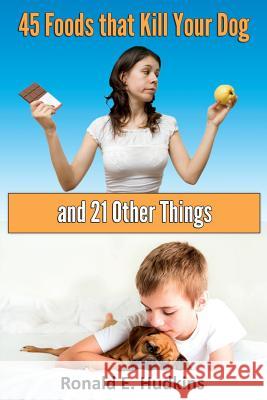45 Foods that Kill Your Dog: and 21 Other Things » książka
45 Foods that Kill Your Dog: and 21 Other Things
ISBN-13: 9781499338942 / Angielski / Miękka / 2014 / 88 str.
In many homes a dog or the dogs almost literally become members of our family. Be cautioned that treating them as humans at mealtimes can cause major injury to them by our good intentions to simply spoil them with scraps from our dinner plates. In this book we will take a look at some of the most dangerous foods for your dog, how these food stuffs affect their bodies, and what to do with your pet in the case of an emergency. We certainly feel great when we treat our pets to human food every once in a while. Those what about me - puppy-dog eyes are hard to resist as they watch your every food consumable motion. They have their animal body language down to a science and usually manage to actually convince us that they are starving and must be scrapped All that schmoozing ability makes you want to share with them a taste of everything you eat. But owner beware Giving in to those eyes, the act and surrendering the human foods over to our dog(s) can actually seriously harm or even kill them. Just how much or what quantity of various types of human food items can sicken or kill your dog is different between various breeds and their likewise different weights. Some really surprising details are provided in this book and are documented to advise you on what foods cause toxic conditions in your dog. Additionally, the various symptoms you should be on the lookout for. According to statistics in 2007, the ASPCA's Animal Poison Control Center received more than 130,000 emergency calls. Most of the reported cases of animal toxic poisoning were caused by common human foods and household items. Some of the more common signs of poisoning include vomiting and diarrhea, muscle tremors or seizures, drooling, redness of skin, ears and eyes and swelling and/or bleeding. It cannot be emphasized enough that the many foods we like can be dangerous to animals. As hard as it is to do, it's actually best to stick to pet food and the diets recommended by your veterinarian. Yet regardless of all the precautions we take to keep our pet pals safe, accidents can and do happen. It is because of the sad reality that the ASPCA, Humane Society and animal advocates advise pet owners to keep the telephone numbers of their local veterinarian and the ASPCA Animal Poison Control Center - (888) 426-4435 - in a prominent easily retrievable location. That being said, even if you only suspect your pet has inhaled, consumed, or come in contact with some kind of toxic substance, stay calm, cool and collect and call for assistance immediately. If you discover your pet consuming anything you think might be toxic, to be safe seek emergency help immediately. This should be your cut in stone precautionary action even if she or he is not exhibiting any of the common signs or symptoms previously mentioned. Better to be safe than sorry is the norm for family and we should be just as cautious about our pets too. Wouldn't you think?
Zawartość książki może nie spełniać oczekiwań – reklamacje nie obejmują treści, która mogła nie być redakcyjnie ani merytorycznie opracowana.











